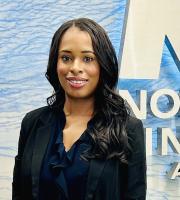How to Catch Up on Your Retirement Savings in Middle Age
By Nikki Young, CFP®
Financial Advisor
Many middle-aged Americans (generally age 45-65) are behind in their retirement savings. If this is you, you’re not alone. According to a 2023 Vanguard study, workers between the ages of 45 and 54 years old had a median 401(k) account balance of approximately $142,069, well below the commonly recommended target of six times your annual salary by aged 50.
The good news for middle agers: it’s not too late to catch up on planning for a financially comfortable retirement. But you’ll have to be strategic in pursuing your savings goals.
Assess your financial status
The first step is to thoroughly analyze your finances. Add up what you’re currently spending each year on necessities, such as housing, transportation, food and medical care, as well as nonnecessities such as streaming services, food delivery and entertainment. Once you have a figure, experts say you can generally assume you’ll need about 80 percent of that amount per year in retirement.
Next, add up how much you have already saved for retirement — the funds you’ve accumulated in employer-sponsored plans or individual retirement accounts (IRAs) — or even nonretirement investment accounts and savings that you can set aside for retirement income. Tip: Don’t forget any old retirement accounts you may have with previous employers.
Create or flesh out your retirement plan
You will also need to determine your target retirement age, considering factors such as your health, level of job enjoyment and family longevity. Once you know your target age, number of years you expect to live and anticipated expenses per year in retirement, you can figure out how much retirement income you’ll need and how much you still need to save.
Online retirement calculators such as those found on calculator.net can give you a quick estimate of how much you need to save for retirement. Better yet, a financial advisor can help guide you in your retirement planning decisions and create a comprehensive retirement plan based on your personal situation, needs and goals.
How to catch up if you’re behind
You may need to cut some or all unnecessary spending. Many middle agers are continuing to foot the bills for grown children. It would behoove you to reduce or eliminate this expense sooner rather than later. Start by having a candid discussion with your child and providing them with a timeline for cut-off.
Increase your automated payroll retirement contributions (especially to the amount required to receive employer matching funds if offered). If you’re 50 and older, make retirement plan “catch-up” contributions each year until you retire. You might also consider retiring later, working part-time in retirement or claiming Social Security at a later age to increase your monthly benefit amount. You could also plan to downsize to a more affordable home or relocate to a less expensive area to reduce your retirement expenses.
Once you reach middle age, if you haven’t focused on saving for retirement, the time to start is now. You still have time to make a meaningful difference in your retirement savings. Having a well-thought-out plan that you commit to following can boost the odds of reaching your desired goals. For assistance, contact me by email, nyoung@nwfllc.com, or visit my website, nyoung.nwfllc.com, to request a complimentary, no-obligation consultation.
The information in this article is for general purposes only and not intended as specific, individualized advice. For personalized advice, we suggest consulting with a qualified financial advisor.
Source: Vanguard, “How America Saves 2023.” The Wall Street Journal, “How to Plan for Retirement if You’re Behind on Saving in Middle Age.” August 21, 2024.




